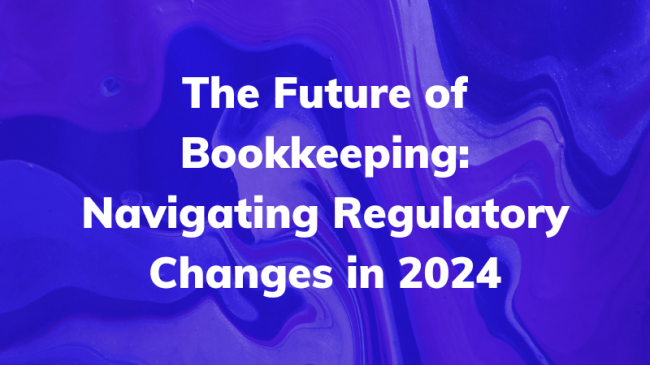
The year 2024 promises to be a period of significant change for the bookkeeping landscape. While core accounting principles remain constant, the regulatory environment is constantly evolving, driven by factors like technological advancements, globalization, and increasing demands for transparency. As a bookkeeper, staying abreast of these changes is crucial to ensure accurate financial records and compliance for your clients.
This blog delves into the key regulatory changes anticipated in 2024 and equips you with the knowledge and strategies to navigate this dynamic environment.
The Rise of Automation and Technology
Automation is rapidly transforming the bookkeeping industry. Cloud-based accounting software, machine learning, and robotic process automation (RPA) are streamlining data entry, reconciliation, and other routine tasks. While these advancements free up time for more strategic analysis, they also necessitate an adaptation of bookkeeping practices.
Regulatory Implications of Automation
The increased reliance on technology necessitates clear guidelines for data security, audit trails, and electronic recordkeeping. Regulatory bodies may introduce stricter protocols to ensure the integrity of electronically stored financial information. Bookkeepers may need to:
- Stay updated on data security best practices: Implement robust password management, encryption protocols, and access controls to safeguard client data.
- Maintain a clear audit trail: Document the origin of all data entries, automate backups, and ensure software systems generate clear audit logs.
- Embrace electronic recordkeeping: Understand regulations regarding electronic signatures, document storage, and long-term archiving of digital records.
Evolving Tax Landscape
Tax regulations are constantly subject to revisions. In 2024, we might see changes in areas like:
- International tax regulations: As global trade dynamics continue to shift, regulations regarding transfer pricing, international tax havens, and digital taxation may evolve. Bookkeepers with international clients need to stay updated on these developments.
- Tax automation: Tax authorities may introduce more automated filing systems, requiring bookkeepers to adapt their software and workflow accordingly.
- Emerging tax policies: Changes in areas like environmental taxes, carbon pricing, or digital service taxes could impact client tax liabilities. Bookkeeping practices should be adaptable to incorporate new tax rules.
Strategies for Navigating Tax Regulatory Changes
- Develop strong relationships with tax advisors: Collaboration with tax professionals ensures your clients receive up-to-date advice on tax implications of business activities.
- Invest in continuing education: Stay informed about new tax legislation through professional organizations, webinars, and online resources.
- Utilize tax automation tools: Consider adopting software that integrates with your accounting system for automated tax calculations and filing.
The Increasing Focus on Transparency
Growing demands for transparency and accountability are shaping regulatory trends. Bookkeepers can expect to see a continued emphasis on areas like:
- Anti-money laundering (AML) regulations: Stricter AML regulations may require bookkeepers to implement enhanced customer due diligence procedures and report suspicious activity.
- Environmental, Social, and Governance (ESG) reporting: Investors and stakeholders are increasingly demanding ESG data. Bookkeepers may need to adapt their processes to capture and report relevant metrics on a company's environmental impact, social responsibility, and governance practices.
- Cybersecurity regulations: As cyber threats become more sophisticated, regulations mandating robust cybersecurity protocols for businesses may be introduced. Bookkeepers assisting with financial data should be aware of these requirements.
Strategies for Promoting Transparency in Your Bookkeeping Practices
- Implement strong internal controls: Develop clear segregation of duties, authorization protocols, and regular reconciliation procedures to ensure data accuracy and prevent fraud.
- Embrace data analytics: Utilize data analytics tools to identify anomalies in financial data that could indicate potential issues.
- Invest in cybersecurity training: Educate yourself and your clients on best practices for data security and cyber hygiene.
The Evolving Role of the Bookkeeper
The evolving regulatory landscape emphasizes the need for bookkeepers to adopt a more strategic and advisory role. Here's how your skillset can adapt:
- Become a technology expert: Gain proficiency in cloud-based accounting software, data analytics tools, and automation technologies.
- Develop strong communication skills: Effectively communicate complex financial information to clients in a clear and concise manner.
- Embrace continuous learning: Stay current with regulatory changes, tax laws, and emerging trends through ongoing education.
Embracing the Future: Actionable Steps for Bookkeepers in 2024
While the broad trends are clear, navigating the specifics of regulatory changes can feel overwhelming. Here are some actionable steps you can take right now to prepare for a successful 2024:
- Conduct a Regulatory Risk Assessment:
Identify your client base: Categorize your clients by industry and size to understand their unique exposure to regulatory changes.
Evaluate current practices: Analyze your bookkeeping processes to identify areas potentially impacted by upcoming regulations.
Prioritize risks: Based on your client base and potential impact, prioritize the regulations requiring immediate attention.
- Invest in Continuous Learning:
Join professional organizations: Membership in organizations like the National Association of Bookkeepers (NAB) or the American Payroll Association (APA) provides access to educational resources and regulatory updates.
Attend industry conferences and webinars: Stay updated on the latest trends and best practices by attending industry events. Many organizations offer online webinars for enhanced flexibility.
Subscribe to regulatory updates: Follow government websites and publications of relevant regulatory bodies to receive timely notifications about rule changes.
- Leverage Technology:
Explore cloud-based accounting software: Cloud-based accounting platforms offer robust security features, automated workflows, and seamless integration with other business applications.
Evaluate data analytics tools: Data analytics tools can help you identify trends, automate data entry, and generate real-time financial reports, freeing up your time for strategic analysis.
Research tax automation solutions: Consider software that integrates with your accounting system for automated tax calculations, filing forms, and managing tax deadlines.
- Build Strategic Partnerships:
Develop relationships with tax advisors: Collaborate with tax professionals to ensure your clients receive expert advice on the tax implications of regulatory changes.
Network with cybersecurity specialists: Partnering with cybersecurity experts can help you implement robust data security protocols and educate your clients on cyber hygiene practices.
Connect with financial institutions: Maintain communication with your clients' financial institutions to stay informed about any regulatory changes impacting their banking services.
- Communicate Effectively with Clients:
Schedule regular meetings: Proactively discuss potential regulatory changes with your clients and explain how you are adapting your services to ensure compliance.
Create informative content: Develop blog posts, infographics, or email newsletters to educate clients about relevant regulatory changes and their potential impact on their business.
Be a trusted advisor: Position yourself as a valuable resource by providing clear explanations, answering client questions, and offering guidance through the complexities of regulatory changes.
Conclusion
The bookkeeping profession is at a crossroads. By embracing technology, upskilling your knowledge base, and building strategic partnerships, you can thrive in the face of regulatory change. Remember, your proactive approach will not only ensure your own success but also provide your clients with the peace of mind and guidance they need to navigate the evolving financial landscape.













